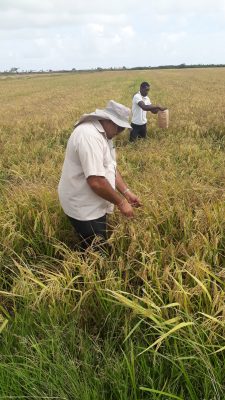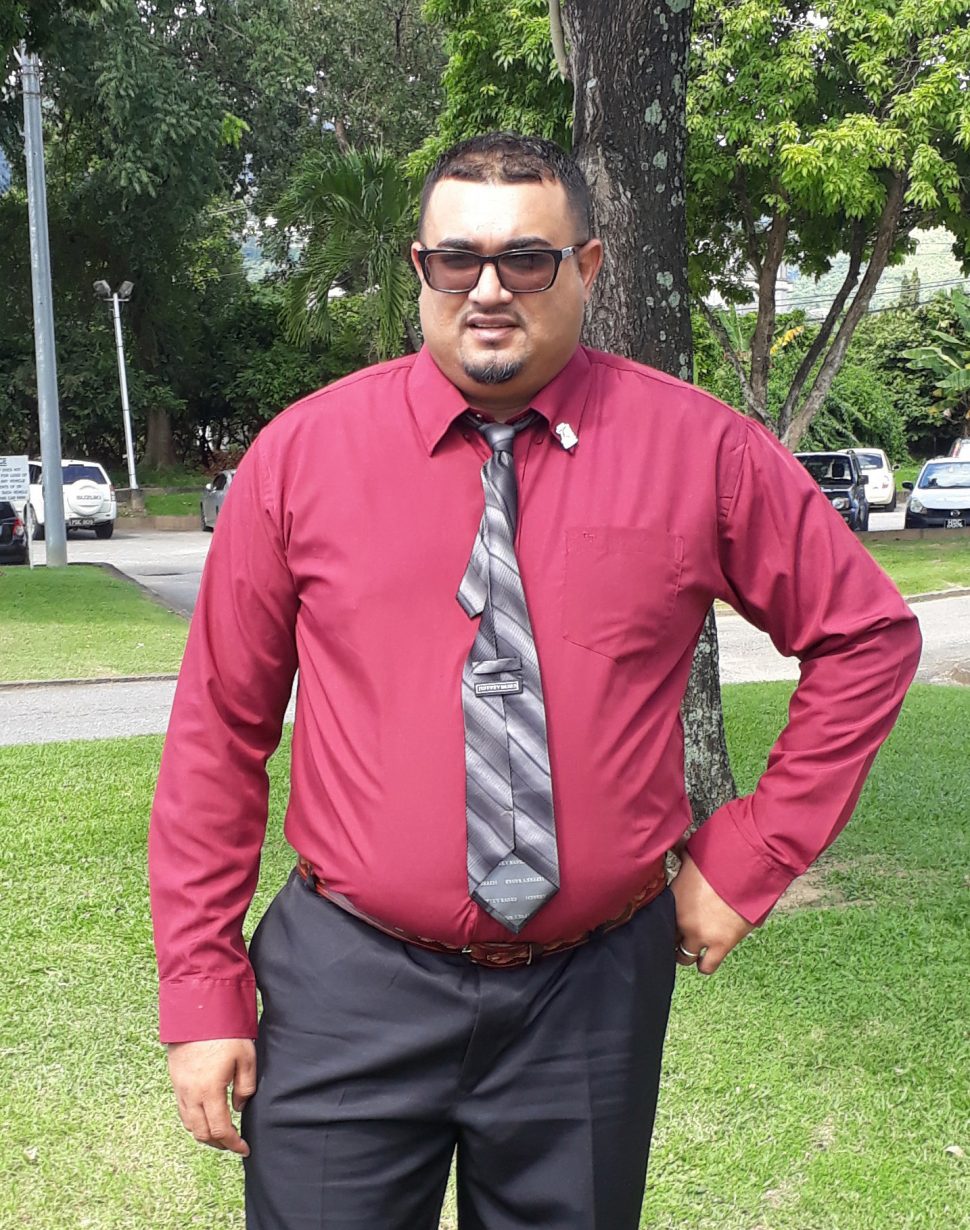Threatened with being pulled out of school and placed to work on his parents’ cash crop farm, a young Rajendra Persaud finally buckled down with his studies and today is a major contributor to the country’s science and research in the area of rice production.
He started as a labourer at the Guyana Rice Development Board (GRDB) but pushed himself to study as he worked and now at the age of 38, is the Plant Pathologist and Head of Department at the board’s Rice Research Station in Burma, Mahaicony, East Coast Demerara.
His work has not gone unnoticed; Dr Rajendra Persaud was recently awarded the Golden Arrow of Achievement by his country.
He shared with the Sunday Stabroek that when he received the call informing him of the honour he felt “extremely delighted and wonderful to see the government and the people of Guyana recognised” his contribution to science, research and development.

“It gives that motivation to continue and do better,” he added.
Looking back at his journey to this day, Dr Raj Persaud, as he is better known, said it has been tough but rewarding. He shared that he came “from a very poor family background” with his father, Soochitran also known as Roy Persaud and mother, Haimwattie Soochitran also known as Gegga being involved in cash crop farming for a livelihood. They lived in the Good Faith-Novar, Mahaicony community. He is the youngest of three children – he has two older sisters – and he described himself as “the small spoil boy for my family.”
They all assisted their parents before and after school and on weekends.
“So, growing up I was a slow learner and very playful… and was not doing very well at school. They threatened me to take me out of school and join them in the farm. That was the turning point of my life where I started to get serious with my schooling,” he told this newspaper.
While he was proud of his hardworking parents, Dr Persaud said he did not want to follow in their footsteps. He recalled the words of his mother: ‘If you na take you education, well then you got to do hard work like me and you daddy’.

“I knew I couldn’t handle that, nor did I like doing hard work, so I decided to get even more serious to further my studies and I followed that path which led me to GRDB,” he said.
It was while he was awaiting his CXC results that he taken on as an intern at the GRDB. He successfully passed 5 subjects and applied for the position of Trainee Laboratory Assistant in the Plant Pathology Department. He was formally employed in September 1997.
He has not looked back since and today holds the proud record of giving more than 20 years of “long, dedicated and exemplary service to my country’s agriculture sector.”
During this period, he worked for a year before receiving sponsorship to attend the Guyana School of Agriculture, where he studied for two years and graduated with a diploma in Agriculture with high credit. He returned to GRDB as a Research Technician and worked for a few more years before being sponsored once again, this time to the University of Guyana where he read for a BSc in Agriculture and graduated with distinction.
Not one to sit around, he soon after returned to his studies and read for his MSc in Plant Pathology at Indira Gandhi Agriculture University at Raipur (CG) in India and he passed with first class honours.
Dr Persaud served the GRDB as Plant Pathologist for a number of years before receiving another scholarship, this time to read for a PhD in Tropical Crop Protection at the University of the West Indies and he completed this with high commendation.
“During this period, I was deeply involved with research work at all levels. I returned after completing my PhD and am now serving as the Plant Pathologist and Head of Department,” he said.
Part-time appointments
Over the years, Dr Persaud also held several part-time appointments. He was Head of the Musa Sp Disease Management Unit at the National Agricultural Research and Extension Institute (NAREI) where he developed a sustainable strategy for the management of Musa diseases in Guyana. He also served as part-time lecturer for the Guyana School of Agriculture Diploma programme and the University of Guyana Applied Plant Pathology course for BSc students.
“Throughout my work and engagement, I have been contributing to academics, science, research and development. This is evident with several local, national and international scientific publications in several high-impact factor journals and chapters in several books,” he said.
Dr Persaud has also represented Guyana at several national and international workshops, trainings and presented research papers at conferences in many countries.
Talking about his work at GRDB, Dr Persaud shared that it is to research, develop and recommend sustainable rice disease management strategies. It involves planning and executing the rice disease management programme and finding solutions to all disease-related problems facing the industry. His work impacts the lives of the Guyanese peoples directly and indirectly.
“[My work] provides sustainable disease management strategies for combating the four major rice diseases facing their cultivation,” he said.
He explained that the advent of the Blast Resistant Screening programme, which he leads, resulted in the development and release of several new blast resistant varieties in Guyana. The varieties, widely cultivated, resulted in higher yields and profits to the rice farmers and the country at large. Through his research as well, Dr Persaud was able to identify several slow genotypes that are resistant to the second most devastating rice disease (sheath blight) as well as developing other environmentally-friendly, alternative disease management strategies. These include the use of plant extracts and identification of suitable biological control agents as the second alternative options in managing both blast and sheath blight disease.
“Also, through my research, several new generation fungicides that were effective against the various diseases were identified and recommended to farmers,” Dr Persaud said.
He added that the new products not only aided in the effective management of rice disease in Guyana but also resulted in better quality paddy grains and higher yields. Similar research work was done with the Musa diseases in Guyana and to this end the researchers were able to find a sustainable management approach to keep the banana and plantain industry afloat.
“The findings of these ground-breaking researches are published in international journals that can be adapted and utilized by many other countries facing similar disease-related problems,” he shared.
‘Cool and calm’
Describing himself, Dr Persaud said he is a “very cool, calm and easy-going person”. But he is also a very focused, hardworking and dedicated individual who is always proactively seeking solutions to problems. Goals are always set, and he works to achieve same because he is very determined.
A dedicated family man, he said he always believes in working for what you want with honesty and sincerity and still believing that better days are still ahead. And while he is cool and easy-going, he warned that one should not get him on the other side because then the sleeping bull will be awakened.
While he pursued his career with vigor Dr Persaud also focused on his family, as he got married at the age of 22 during his second year at the University of Guyana. The union has produced two daughters, Darshanie and Chandradai, and one son Manjeet.
Dr Persaud is grateful to his supervisors at GRDB and its management for seeing his potential from day one. He said they encouraged and supported him by providing him with fully-funded scholarships to further his studies.
“I am forever thankful to the then and now management, chairmen, board of directors and my staff for their support throughout this journey of academics and research,” he said.
Dr Persaud is not yet done contributing to his country as he believes with his academic achievements, specialized skills, years of service and work experience he can do much more. Still a relatively young man, Dr Persaud revealed that he wants “to do much more to help my people and my country. I am looking forward for the opportunity to make that impact at a higher level in the future… I stand willing and ready to continue serve my country; for a better Guyana for its people.”
His parting words to those who are upcoming and even to those who are already established: “Stay humble, stay focused, stay dedicated, work hard and success will surely follow… Remember my Guyanese brothers and sisters, better days are still ahead for all of us…”





